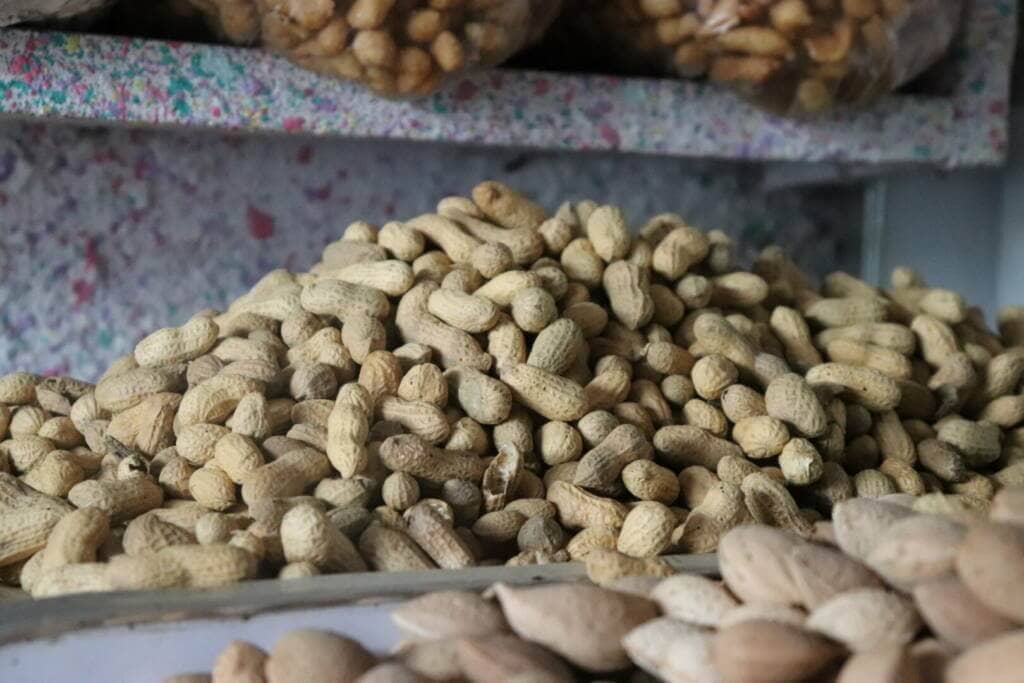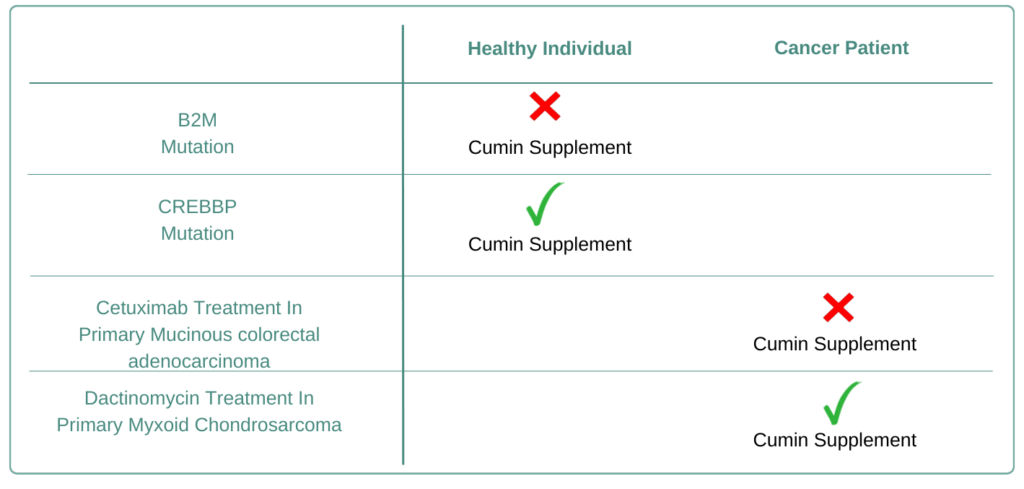Highlights
Cumin is widely recognized for its health benefits and is frequently used by cancer patients and those at genetic risk. Yet, the safety and effectiveness of Cumin for cancer patients depend on many factors like the cancer indication, chemotherapy, other treatments, and the tumor’s genetics. Knowing that some foods and supplements, such as grapefruit and spinach, might interact poorly with cancer medications and cause adverse reactions is crucial.
Diet is critical for cancer treatment as it can affect treatment outcomes. Cancer patients must carefully select and incorporate suitable foods and supplements into their diets. For example, Cumin could benefit those with Primary Myxoid Chondrosarcoma undergoing Dactinomycin, but it might not be good for patients receiving Cetuximab for Primary Mucinous colorectal adenocarcinoma. Furthermore, while Cumin could help individuals with a genetic risk factor “CREBBP”, it may not be suggested for those with a different genetic risk “B2M”. Personalizing diet plans based on health, treatment, and genetics is essential.
Understanding that making a decision on the suitability of Cumin for a cancer patient needs to be individualized is crucial. Critical factors like the type of cancer, treatment methods, genetic makeup, genetic risks, age, body weight, and lifestyle are vital in deciding if Cumin is the appropriate choice. Genetics and genomics, in particular, is a significant consideration. Since these factors can evolve, it’s essential to regularly review and adapt dietary choices to match changes in health status and treatment.
In conclusion, a holistic approach to dietary choices is vital, focusing on the overall effects of all active components in foods/supplements like Cumin instead of assessing each active ingredient separately or ignoring it completely. This broad perspective fosters a more rational and scientific approach to diet planning for cancer.
Brief Overview
Use of plant-based foods and supplements, such as vitamins, herbs, minerals, probiotics, and various specialized supplements, are rising among cancer patients. These supplements are designed to deliver high concentrations of specific active ingredients, many of which are also in different foods. The concentration and diversity of active ingredients differ between whole foods and supplements. Foods typically offer a range of active ingredients but at lower concentrations, while supplements provide higher concentrations of specific ingredients.
Considering the varied scientific and biological functions of each active ingredient at the molecular level, it’s crucial to account for the combined effects of these components when deciding on foods and supplements to eat or not.

The critical question arises: Should you incorporate Cumin into your diet as a food item or a supplement? Is it advisable to consume Cumin if you have a genetic predisposition to cancer associated with the CREBBP gene? What if instead your genetic risk stems from the B2M gene? Is it beneficial to include Cumin in your diet if you’re diagnosed with Primary Mucinous colorectal adenocarcinoma, or if your diagnosis is Primary Myxoid Chondrosarcoma? Moreover, how should your consumption of Cumin be adjusted if you’re undergoing Dactinomycin treatment or if your treatment plan shifts from Dactinomycin to Cetuximab? It’s essential to recognize that simplistic assertions like ‘Cumin is natural, so it’s always beneficial’ or ‘Cumin boosts immunity’ are insufficient for informed food/supplement choices.
Additionally, it’s essential to reassess the appropriateness of including Cumin in your diet if there are changes in your treatment regimen. In summary, when making decisions about incorporating foods or supplements like Cumin into your diet for its benefits, you should consider the overall biochemical effects of all ingredients, considering factors such as the type of cancer, the specific treatments you’re undergoing, genetic predispositions, and lifestyle choices.
Cancer
Cancer remains a significant challenge in the medical field, often causing widespread anxiety. However, recent advancements have improved treatment outcomes, notably through personalized treatment approaches, non-invasive monitoring methods using blood and saliva samples, and the development of immunotherapy. Early detection and timely intervention have been crucial in positively influencing overall treatment outcomes.
Genetic testing offers significant promise in evaluating cancer risk and susceptibility early on. However, for many individuals with familial and genetic predispositions to cancer, options for therapeutic intervention, even with regular monitoring, are often limited or none. Once diagnosed with a specific type of cancer, such as Primary Myxoid Chondrosarcoma or Primary Mucinous colorectal adenocarcinoma, treatment strategies need to be customized based on the individual’s tumor genetics, the stage of the disease, as well as factors like age and gender.”
Post-treatment, ongoing monitoring is essential to detect any signs of cancer relapse and to inform subsequent decisions. Many cancer patients and those at risk often seek advice on incorporating certain foods and supplements into their diets, which plays a crucial role in their overall decision-making process regarding health management.
The critical question is whether to factor in genetic risks and specific cancer diagnoses when deciding on dietary choices, such as Cumin. Does a genetic risk for cancer stemming from a mutation in the CREBBP have the same biochemical pathway implications as a mutation in the B2M? From a nutritional standpoint, does the risk associated with Primary Myxoid Chondrosarcoma equate to Primary Mucinous colorectal adenocarcinoma? Furthermore, does the dietary consideration remain the same for those undergoing Cetuximab as for those receiving Dactinomycin? These considerations are crucial in making informed food choices for individuals with different genetic risks and cancer treatments.
Cumin – A Nutritional Supplement
The supplement Cumin encompasses a range of active ingredients, including Vitamin A, Linoleic Acid, Trans-trans-farnesol, Palmitic Acid and Beta-sitosterol, each present at varying concentrations. These ingredients influence molecular pathways, specifically Cell Cycle Checkpoints, MYC Signaling, JAK-STAT Signaling and Oncogenic Histone Methylation, which regulate critical aspects of cancer at the cellular level, such as tumor growth, spread, and cell death. Given this biological influence, selecting the appropriate supplements like Cumin, alone or in combination, becomes a critical decision in the context of cancer nutrition. When considering using Cumin for cancer, it’s essential to consider these various factors and mechanisms. This is because, similar to cancer treatments, the use of Cumin is not a universal decision suitable for all cancers but needs to be personalized.
Choosing Cumin Supplements
Addressing the question ‘When should I avoid Cumin in the context of Cancer’ is challenging because the answer is highly individualized – it simply ‘Depends!’. Similar to how any cancer treatment may not be effective for every patient, the relevance and safety or benefits of Cumin varies depending on personal circumstances. Factors such as the specific type of cancer, genetic predispositions, current treatments, other supplements being taken, lifestyle habits, BMI, and any allergies all play a role in determining whether Cumin is appropriate or should be avoided, underlining the importance of personalized consideration in such decisions.
Foods to Eat After Cancer Diagnosis!
No two cancers are the same. Go beyond the common nutrition guidelines for everyone and make personalized decisions about food and supplements with confidence.
1. Will Cumin Supplements benefit Primary Mucinous colorectal adenocarcinoma Patients undergoing Cetuximab treatment?
Primary Mucinous colorectal adenocarcinoma is characterized by particular genetic mutations, namely TTN, APC and KRAS, which lead to alterations in biochemical pathways, specifically MYC Signaling, Angiogenesis, G-protein-coupled Receptor Signaling and Growth Factor Signaling. The effectiveness of a cancer treatment, such as Cetuximab, is contingent on its mechanism of action on these specific pathways. The ideal strategy involves aligning the treatment’s action with the pathways driving the cancer, thereby ensuring a personalized and effective approach. In such scenarios, avoiding foods or nutritional supplements that might counteract the treatment’s effects or diminish this alignment is crucial. For instance, the Cumin supplement, which affects the MYC Signaling, may not be the right choice in the case of Primary Mucinous colorectal adenocarcinoma when undergoing Cetuximab. This is because it may either exacerbate the disease’s progression or interfere with the treatment’s efficacy. When choosing a nutrition plan, it’s important to consider factors such as cancer type, ongoing treatments, age, gender, BMI, lifestyle, and any known genetic mutations.
2. Will Cumin Supplements benefit Primary Myxoid Chondrosarcoma Patients undergoing Dactinomycin Treatment?
Primary Myxoid Chondrosarcoma is identified by specific genetic mutations, such as IDH1, NR2E1 and WDFY4, which result in changes in biochemical pathways, particularly Cell Cycle Checkpoints, Oncogenic Cancer Epigenetics and Glutathione Metabolism. The efficacy of a cancer treatment, like Dactinomycin, is determined by its interaction with these pathways. The aim is to ensure that the treatment aligns well with the pathways that drive the cancer, enabling a personalized treatment approach. In this context, foods or supplements that are compatible with the treatment or enhance this alignment should be considered. For example, the Cumin supplement is a rational option for those with Primary Myxoid Chondrosarcoma undergoing Dactinomycin. This is because Cumin influences pathways such as Cell Cycle Checkpoints, which can either inhibit the factors driving Primary Myxoid Chondrosarcoma or benefit the effectiveness of the Dactinomycin.
3. Are Cumin Supplements Safe for Healthy Individuals with B2M Mutation Associated Genetic Risk?
Various companies provide gene panels for assessing the genetic risk of different types of cancers. These panels include genes linked to breast, ovarian, uterine, prostate, and gastrointestinal cancers. Testing these genes can confirm a diagnosis and inform treatment and management strategies. Identifying a variant that causes disease can further assist in the testing and diagnosing of relatives who may be at risk. The B2M gene is commonly included in these panels for cancer risk assessment.
A mutation in the B2M gene affects biochemical pathways or processes, such as JAK-STAT Signaling and Antigen Presentation, which are directly or indirectly involved in driving cancer at the molecular level. When a genetic panel identifies a mutation in the B2M associated with an increased risk of Diffuse Large B-cell Lymphoma, scientific rationale suggests avoiding use of supplement Cumin. This is because supplement Cumin influences pathways like JAK-STAT Signaling, which can lead to adverse effects in the context of the B2M mutation and related cancer conditions.
4. Are Cumin Supplements Safe for Healthy Individuals with CREBBP Mutation Associated Genetic Risk?
CREBBP plays a crucial role in cancer risk assessment. Mutations in CREBBP can disrupt critical biochemical pathways, including Oncogenic Histone Methylation and Histone/Protein Acetylation, which influence cancer development. If your genetic panel reveals mutations in CREBBP associated with Follicular Lymphoma, consider incorporating Cumin supplements in your nutrition plan. These supplements can positively influence pathways like Oncogenic Histone Methylation, benefit by providing relevant support for individuals with CREBBP mutations and related health concerns.

In Conclusion
The two most important things to remember are that cancer treatments and nutrition are never the same for everyone. Nutrition, including food and supplements like Cumin, is an effective tool that can be controlled by you while facing cancer.
“What should I eat?” is the most commonly asked question by cancer patients and those at-risk of cancer. The correct response is that it depends on factors such as cancer type, genetics of tumor, current treatments, allergies, lifestyle, and BMI.
Get your nutrition personalization for cancer from addon by clicking the link below and answering questions about your cancer type, treatment, lifestyle, allergies, age, and gender.
Personalized Nutrition for Cancer!
Cancer changes with time. Customize and modify your nutrition based on cancer indication, treatments, lifestyle, food preferences, allergies and other factors.
References
- Comparison of groups when outcomes are on an ordered scale.
- Genetically defined subsets of human pancreatic cancer show unique in vitro chemosensitivity.
- Pan-cancer analysis of whole genomes.
- Paederia foetida induces anticancer activity by modulating chromatin modification enzymes and altering pro-inflammatory cytokine gene expression in human prostate cancer cells.
- cBioPortal for Cancer Genomics
- β-Sitosterol targets Trx/Trx1 reductase to induce apoptosis in A549 cells via ROS mediated mitochondrial dysregulation and p53 activation.
- cBioPortal for Cancer Genomics
